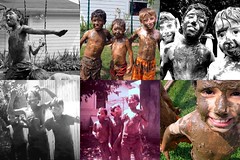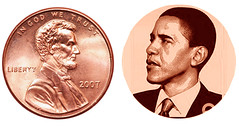 Happiness, Falling From The Sky
Happiness, Falling From The Sky
Originally uploaded by lorenzodom1. From Mud to Men 033, 2. From Mud to Men 001, 3. From Mud to Men 026, 4. Mude Mites (One for Rusty Rabbit), 5. The Mud Mites, 6. From Mud to Men 040
HAPPINESS, FALLING FROM THE SKY
New York City, NY February 24, 2009 — Backyard, San Jose, CA, circa 1975:
There's been a lot of ballyhoo lately over the little-film-that-could from Bollywood.
Ever since Slumdog Millionaire won eight Oscars, including Best Picture, two nights ago, the media has had a field day with this rags-to-riches story of many levels.
For not only does the movie tell the tale of a boy who makes it out of the slums by ultimately beating a conniving game show host at his own game, but the film was also made on a “shoestring” budget—a mere $13 million, a tenth of the cost of its cinematic rival "The Curious Case of Benjamin Button."
Whether or not the movie actually merits these coveted gold statuettes may be debated for some time to come. Personally, I thought the movie was “okay.” However, I found the real-life story of how it was made with real people, who live in real squalor, much more intriguing.
I hope with the spurt of media coverage on the impoverished areas where the movie was filmed that people in Western society will get some insight into how a lot of the world lives, and in turn realize how lucky we have it, despite our current maelstrom of economic worries and woes.
This morning, I read a version of an article that the Metro picked up off the wire from AP. The excerpt is titled “The Oscar goes to…India” and is pared down to a cheery summary, ending with a quote from one of the neighbors of the child stars. As he watched his little friend strut the red carpet on a television set that was being shared in a dirt yard with a dozen other people, Sohail Qureshi told a reporter “It seems like happiness is falling from the sky.”
I was touched by this expression of genuine glee and in a moment of make-believe, it made me feel that all of a sudden a whole country was happy for one of its own.
Or at least, that’s what the media would make us believe. For if you read the whole story below, you’ll see that the real picture is a bit gloomier. Following is an excerpt:
“If the Oscar excitement brought a sheen of glamour to the community, it vanished Monday shortly after the final award was announced.
The journalists left, the dancing stopped and life pressed on as always. The sweatshop men hunched over humming sewing machines. Squatting children relieved themselves by the train tracks. Mothers washed their dishes in murky water.
"I am poor," Fakrunissa Sheikh, 40, said inside her lean-to next to Azhar's.
About 65 million Indians -- roughly a quarter of the urban population -- live in slums, according to government surveys. Health care is often nonexistent, child labour is rampant and inescapable poverty forms the backdrop of everyday life.”
*
That said, I still think there is something to be said about the revelry amidst the ruins.
Like I’ve written elsewhere (see Pocket Change: Let’s Start A Revolution), once pulled out of poverty, studies have shown that it doesn’t make a difference if you’ve got $100,000 or $100 million, because ultimately happiness is determined by making the most of what you’ve got; it is a matter of attitude and gratitude, not simply means.
Thus, even though these people face poverty that many of us will never know, somehow they found time to have fun and be happy for one of their friends, regardless of their circumstances.
I grew up playing in empty dirt lots and on train tracks, the concept of the Gymboree did not even exist; I drank water from garden hoses, which we used to fill a shallow dirt hole in backyard, so that my cousins and I could roll around like swine and mud wrestle; I caught butterflies and bugs with my bare hands and kept them in old Mason jars, the lid of which I poked holes in with a number 2 lead pencil. Point is, I didn’t have much growing up, but somehow, with a little imagination, my childhood friends and I made it work, we were authentically happy, if not often overjoyed.
I’ve observed this basic principle many times over the last nine years watching my own children, who have had as much fun playing in the mud as I did 34 years ago. In fact, my two rambunctious boys seem to have much more fun with empty appliance boxes, string, and sticks than with the treasure trove of plastic Christmas and birthday gifts they have stored and largely untouched in a sprawling playroom in the basement. Their favorite game of late has been hide-and-go-seek and it honestly amazes me how they all hide in the same places over and over again, but somehow they exuberantly can play the game for hours.
Point is, when it comes to happiness, less is truly more. If you can be happy with yourself, the little you’ve got and the people you are fortunate enough to share it with, than you can be as happy as anyone else in the world.
I think the last line of the article below sums it up the best for me:
"When she comes back," Saba said, "we will have the biggest party."
Yeah Saba!
Oscar celebrations fill Mumbai's crowded slums
(From The Associated Press, Mon. Feb. 23 2009)
MUMBAI, India -- In the narrow lanes behind the Mumbai train tracks, the slum's first Oscar party turned into a raucous celebration of two hometown heroes, complete with Bollywood dance moves and squeals of joy from old friends.
Every time the big-eyed girl who calls this slum home appeared on TV, her friends gawked, beamed, shouted -- and danced.
Rubina Ali, nine, was plucked from the tin roof shack she shares with her parents and six siblings in this squalid Mumbai slum to star in "Slumdog Millionaire," the darling of this year's Academy Awards.
Her friend and neighbour, Azharuddin Mohammed Ismail, 10, was also chosen for the film, and both were flown to Los Angeles to watch "Slumdog" nab eight Academy Awards, including the Oscars' highest honour for best film.
Crowds gathered around the few television sets in the slum and it took barely a minute for word of each award to spread through the slum's winding lanes.
"It seems like happiness is falling from the sky," said Sohail Qureshi, a neighbour who said he had watched Rubina grow up.
The Bandra slum could not be farther from the Hollywood glitz, stretch limousines and designer dresses of the Oscars.
Azhar lives in a lean-to made of plastic tarpaulins and mouldy blankets. Rubina's home is perched above an ocean of trash. Dirty train tracks and a clogged highway form the slum's borders.
Hordes of journalists descended on the neighbourhood Monday. TV tripods straddled the thin stream of sewage outside Rubina's home while rows of satellite trucks idled outside a usually sleepy tea stall.
"Normally, no one talks to us and no one comes here, but now everyone is here," Mohammed Ismail, Azhar's father, said before a bouquet of flashing bulbs.
If the Oscar excitement brought a sheen of glamour to the community, it vanished Monday shortly after the final award was announced.
The journalists left, the dancing stopped and life pressed on as always. The sweatshop men hunched over humming sewing machines. Squatting children relieved themselves by the train tracks. Mothers washed their dishes in murky water.
"I am poor," Fakrunissa Sheikh, 40, said inside her lean-to next to Azhar's.
About 65 million Indians -- roughly a quarter of the urban population -- live in slums, according to government surveys. Health care is often nonexistent, child labour is rampant and inescapable poverty forms the backdrop of everyday life.
Although everyone from the local butcher to the prime minister called the Oscar coup a proud day for the country, "Slumdog Millionaire" was hardly a phenomenon with Indian audiences.
"Hit in the West, flop in the East," read a front page headline in DNA's Sunday newspaper. The film was a tough sell in Indian movie theatres because it was largely in English, featured few giant stars, and skimped on the dance numbers.
Many people here also objected to its gritty portrayal of India, as well as its title, which some took as derogatory. The film sparked protests in Mumbai and at least one north Indian city by slum residents who said the movie demeaned the poor.
"No one can call me a dog," Sheikh said Monday. "I work very hard."
A widow and mother of seven, Sheikh is a housekeeper who said she earns 600 rupees (US$15) a week.
She said the movie has been good for the families of Azhar and Rubina, but that her days are as difficult as ever.
"Look at my house," she said, pointing to the walls made of rags and the mud floor covered with a thin plastic tarp. "What has changed?"
The "Slumdog" filmmakers said they wrestled with the complications of working with children from impoverished families. Danny Boyle -- who won the Oscar for best director -- and producer Christian Colson decided to help Azhar and Rubina by securing them spots in Aseema, a nonprofit, English-language school in Mumbai.
Rubina's parents were thrilled with Boyle and his team.
"Whatever a parent could have done, they have done much more than that," Rafiq Qureshi said during the run-up to the awards.
Neighbours said they were nothing but happy for the child actors.
"It's Rubina's fate," said Mohammed Muzzammil, 22. "We don't want anything from her success."
Rubina's best friend Saba Qureshi wants something, however -- lots of stories and pictures from Los Angeles.
"My eyes couldn't believe that I was seeing Rubina in America," said Saba, who led her sisters in Bollywood dance numbers throughout the morning. "She looked like an angel."
"When she comes back," Saba said, "we will have the biggest party."








